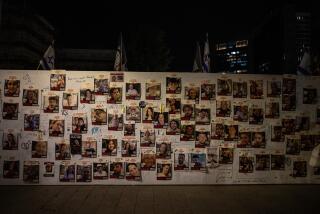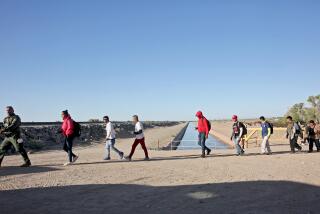Politics and the no-fly list
The case of the alleged Christmas bomber, Umar Farouk Abdulmutallab, is being called a massive intelligence failure. And the evidence thus far does suggest a possible lapse in the governmentâs management of terrorist watch lists.
But if so, the blame doesnât lie wholly with government agencies charged with maintaining the lists. Some share of responsibility lies with civil libertarian extremists who have ceaselessly lambasted the entire no-fly system.
Maintaining a terrorist watch list is a highly complex task. The problem includes not only assembling a list of potential suspects but distributing the information on the list to visa offices, border checkpoints, cargo facilities and the like in a timely fashion. The correct spelling of foreign names, with all the variants arising from translation, is in itself a highly complicated endeavor. Criteria for inclusion of a subject on a watch list must be established. And then there is the difficulty of training agents, many of them with little understanding of the nuances of places such as Yemen and Nigeria, to operate the system.
News reports suggest that Abdulmutallabâs name was added to a government list of people with suspected ties to terrorism in November, after his father warned the American embassy in Lagos, Nigeria, that he had embraced Islamic extremism.
Abdulmutallab was not, however, on the far shorter no-fly list maintained by the FBI, which is why he was able to board without apparent problem the Northwest Airlines flight bound for Detroit. According to testimony before a Senate committee in early December by Timothy J. Healy, director of the FBIâs Terrorist Screening Center, the consolidated watch list maintained by the FBI currently consists of about 400,000 names. But of these, only about 3,400 have been placed on the no-fly list. In other words, about 396,600 individuals who have a suspected link to terrorism are permitted to fly.
A Justice Department audit last spring found numerous flaws in the terrorist watch system. As new information flows into the FBI, it is required to update the lists. Yet according to the audit, in 67% of the cases it sampled, âthe FBI case agent primarily assigned to the case failed to modify the watch list record when new identifying information was obtained during the course of the investigation, as required by FBI policy.â
The inevitable complexity of the watch list process guarantees significant errors. On one side lies the problem of innocent people finding themselves on the list: There have been more than a few notorious cases of error, including instances in which federal air marshals were themselves barred from flying. On the other side lies the problem of alleged terrorists like Abdulmutallab being allowed to fly.
Reducing both types of errors is obviously highly desirable. But given the nature of the dangers that the lists are designed to avert, a reasonable policy would tilt toward over-inclusiveness.
And here is where the political context becomes critical. The Bush administration was subjected to withering criticism for the way it managed the no-fly list. The American Civil Liberties Union put the system on its own list of the âTop Ten Abuses of Power Since 9/11,â asserting that âthe uncontroversial contention that Osama bin Laden and a handful of other known terrorists should not be allowed on an aircraftâ has been exploited âto create a monster.â In one of several lawsuits the group has filed involving terrorist lists, the ACLU alleged that they âviolate airline passengersâ constitutional right to freedom from unreasonable search and seizure and to due process of law.â
Patrick Leahy (D-Vt.), chairman of the Senate Judiciary Committee, has been one among a chorus of voices that accused the former administration of being far too sweeping, placing âinfants, nuns and even members of Congressâ on terrorist watch lists. The writer Naomi Wolf has called travel restrictions such as the no-fly list, âa classic part of the fascist playbookâ akin to the depredations of Nazi Germany, where âfamilies fleeing internment were traumatized by the uncertainties that they knew they faced at the borders.â This was hysteria directed against Bush counter-terrorism mechanisms that the Obama administration has left almost entirely unchanged.
The Department of Homeland Security has indeed received a high volume of complaints about airport screening by individuals attempting to travel. Yet only a minuscule 0.7% of the complaints stemmed from issues relating to the watch lists. And of that 0.7%, about 51% of the complaints led to the conclusion that the individual in question was appropriately on the watch list. Whatever problems exist, the system is not outrageously over-inclusive. Indeed, if anything, the opposite is the case.
We will never know whether fierce criticism from the left had any direct effect on the processing of Abdulmutallabâs file, but the political environment is important to consider going forward. The officials managing the watch lists are not eager to be hauled before a congressional committee if they blunder and bar innocent people from getting on flights. But they are also acutely aware of the potential price tag of being under-inclusive.
The problem with over-inclusiveness is that innocent people will suffer major inconvenience and that counter-terrorism resources are wasted. But if the lists are under-inclusive, innocent people can die, and in large numbers. If asked to choose between over- and under-inclusiveness on the watch lists, the passengers of Northwest Flight 253 no doubt would have their preference.
Gabriel Schoenfeld, a resident scholar at the Witherspoon Institute and a senior fellow at the Hudson Institute, is the author of âNecessary Secrets: National Security, the Media, and the Rule of Law,â due out in 2010.
More to Read
Sign up for Essential California
The most important California stories and recommendations in your inbox every morning.
You may occasionally receive promotional content from the Los Angeles Times.










